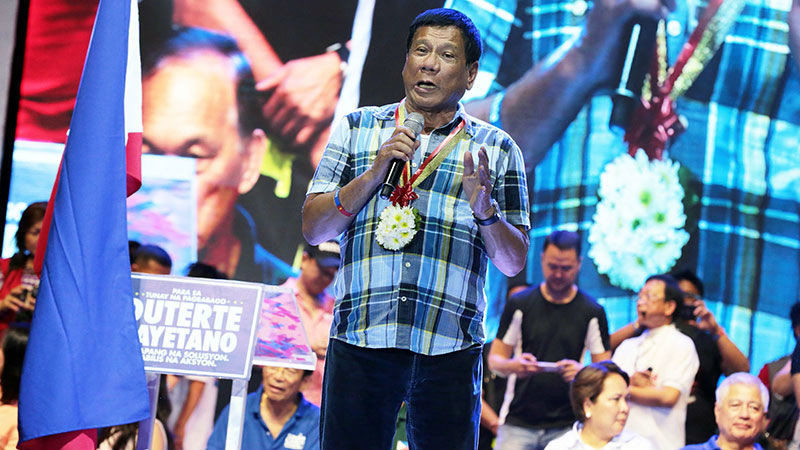
Presidential candidate Mayor Rodrigo Duterte delivers a speech at the FTI in Taguig during a grand rally Monday night, April 12, 2016. INQUIRER PHOTO / GRIG C. MONTEGRANDE
DAVAO CITY Mayor Rodrigo “Digong” Duterte has surged to take the lead in the latest voter preference polls for next month’s presidential election.
The bigger picture is more than the results of the polls. The results present a chilling picture of Duterte, a provincial politician who has no national constituency, attempting to establish a dictatorship just 30 years after the overthrow of the Marcos regime in the 1986 Edsa People Power Revolution.
For the first time since 1986, a local politician, Duterte, is mounting a challenge to Philippine electoral democracy highlighting two profound constitutional issues: arrest without warrant and due process and extrajudicial execution of crime suspects through death squads.
It may be true that the polls reflect a popular call for a government that get things done, but Duterte is apparently using the poll results to go around due process.
At the start of this column, we put the defining issue as the balance of power between the central government and local governments.
One-man rule
As a veteran journalist who saw the restoration of electoral democracy in 1986, I am appalled at Duterte’s attempts to install one-man rule in place of the consensus-driven mode of political change.
Duterte seeks change on a very limited experience as a local executive from the hinterlands of Mindanao.
From his experience and educational background, Duterte comes off as an intellectual illiterate who has nothing more substantial to offer in public discourse than bluster and one-liners passed off as sound arguments.
Whether it is Duterte or Vice President Jejomar Binay or the Liberal Party’s Mar Roxas who gets elected, the key issue remains who will be at the helm to direct the transformation of Philippine constitutional democracy in the post-Aquino years.
All the issues are irrelevant, most of all Duterte, who does not embody any ideology for political and social change. He is a big joke—not to be taken seriously.
During the first two presidential debates on the candidates’ platforms, the Liberal Party stood firm on its position that the public should assess Roxas on the strength of his bureaucratic experience and intellectual credentials despite his low poll ratings.
In contrast, Duterte has played the demagogue card to win points.
For instance, Duterte said he would not hesitate to engage China in a shooting war over disputed territories in the South China Sea, revealing his instability on foreign policy issues. More of this instability will be on test in the next few days.
It is possible the rankings of the presidential candidates will change in the 22 days remaining before the vote, but it is not clear whether Duterte’s lead will hold.
Duterte is trying to stampede us into believing that the polls show that his election is inevitable. He is beginning to believe his own propaganda and he is listening to the noise he is creating in his campaign.
Tight contest
The presidential race has entered a crucial period during which the polls will change and the change will shock Duterte.
The latest Social Weather Stations poll results published by Business World showed Duterte at the top of the list, with 27 percent, a 4-point lead over Sen. Grace Poe, who had 23 percent, followed by Vice President Binay, who had 20 percent, and Roxas, 18 percent.
Given that the presidential race is a tight contest and the outcome is uncertain, we should ask at this point what is the defining issue and who is the pacemaker in these election.

